旅游专业英语教程unit 1
- 格式:ppt
- 大小:498.00 KB
- 文档页数:8
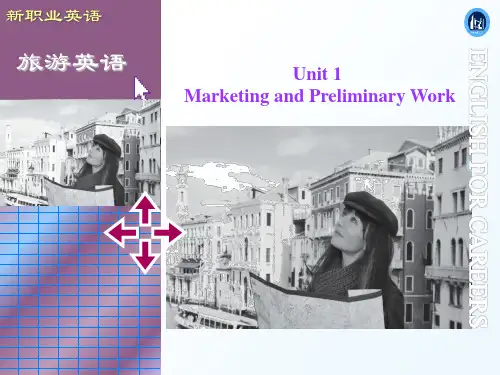
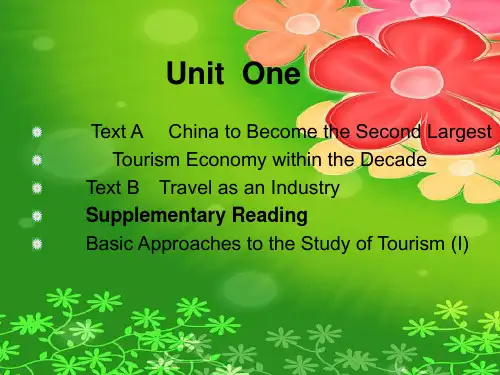
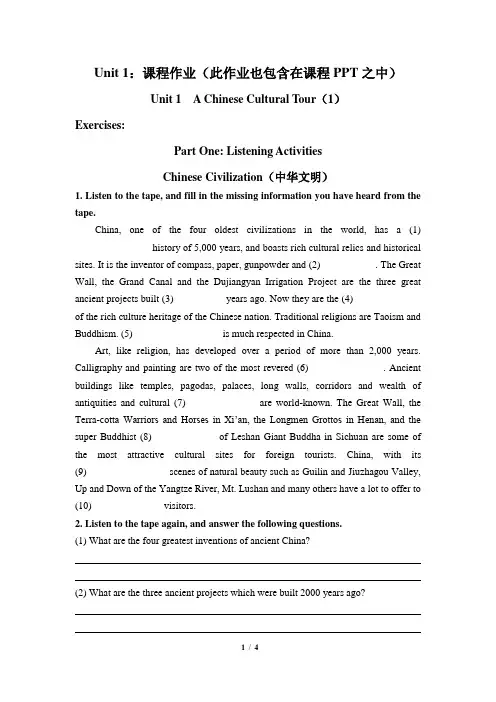
Unit 1:课程作业(此作业也包含在课程PPT之中)Unit 1 A Chinese Cultural Tour(1)Exercises:Part One: Listening ActivitiesChinese Civilization(中华文明)1. Listen to the tape, and fill in the missing information you have heard from the tape.China, one of the four oldest civilizations in the world, has a (1) _______________ history of 5,000 years, and boasts rich cultural relics and historical sites. It is the inventor of compass, paper, gunpowder and (2)___________. The Great Wall, the Grand Canal and the Dujiangyan Irrigation Project are the three great ancient projects built (3)__________ years ago. Now they are the (4) _____________ of the rich culture heritage of the Chinese nation. Traditional religions are Taoism and Buddhism. (5) _________________ is much respected in China.Art, like religion, has developed over a period of more than 2,000 years. Calligraphy and painting are two of the most revered (6)_______________. Ancient buildings like temples, pagodas, palaces, long walls, corridors and wealth of antiquities and cultural (7)______________ are world-known. The Great Wall, the Terra-cotta Warriors and Horses in Xi’an, the Longmen Grottos in Henan, and the super Buddhist (8) ____________ of Leshan Giant Buddha in Sichuan are some of the most attractive cultural sites for foreign tourists. China, with its (9)________________ scenes of natural beauty such as Guilin and Jiuzhagou Valley, Up and Down of the Yangtze River, Mt. Lushan and many others have a lot to offer to (10)______________ visitors.2. Listen to the tape again, and answer the following questions.(1) What are the four greatest inventions of ancient China?(2) What are the three ancient projects which were built 2000 years ago?(3) What are the traditional religions of China? Do you think that Confucianism is a Chinese religion?(4) What are the famous cultural sites and natural sites in China? Give examples.Part Two: Situational DialogueConfucius(孔子)Ⅰ. Listen to the dialogue, and decide whether the statements are true or false. If it is true, put “T” in the space provided and “F” if it is false. (pages 5-6)1. ______ You can only find the Confucius Temple in Qufu, the hometown of Confucius in Shandong Province.2. ______ Kong Qiu was acclaimed as Saint Kong and highly respected by the emperors in feudal society.3. ______ Confucius was a teacher, but he only accepted the wealthy students.4. ______ Confucius was also a philosopher, and he mainly taught politics and philosophy.5. ______ Today’s quality-education is based on the concept of all-round development education advocated by Confucius.Part Four: ABC about TourismMass Tourism(大众旅游)Read the passage and choose the best answer from the four choices given below. (pages 10-11)()1. The Grant Tour can be defined asA. mass tourismB. travel for holidaysC. travel exclusively for pleasureD. travel mainly for education and pleasure()2. The idea of mass tourism in the modern sense did not exist in 18th century becauseA. people travel mainly for the official purposeB. people travel exclusively for the educational purposeC. people travel primarily for the business purposeD. few people traveled beyond their village and nearest market town.()3. Why did the Industrial Revolution speed up the rise of mass tourism?A. invention of trains and shipsB. rapid expansion of the middle class’s wealthC. the desire to know more about the worldD. A, B and C()4. One of the following factors did not facilitate the coming of mass tourism.A. increase numbers of car ownershipB. growth of motel chainsC. practical barriers to foreign travel within EuropeD. extensive use of package holidaysPart Five: Additional Know-howIII. TranslationChinese Local Religion-Taoism中国本土宗教——道教Translate the following sentences into Chinese. (pages 14-15)1. Taoism was indigenous(本土的) religion in China. Originated around the 2nd century A.D., it has exerted a far-reaching impact (深远影响) on the Chinese philosophy, folk customs (民俗), medical science, fine arts (美术), and Wushu (武术), etc.2. Zhang Daoling(张道陵) is credited as its founder, Lao Zi(老子) is regarded as itsmaster and his work and Dao de jing (Classic of the Way of Power《道德经》) is its main doctrine.3. By the 14th century, Taoism had been divided into many sects(派系)and developed into two main philosophies: Quanzhen Sect(全真道), emphasizing self-cultivation to attain immortality and Zhengyi Sect(正一道), involving belief in charms and spells.4. Daoist music is a kind of religious music with Chinese characteristics(中国特色), mainly used in religious rituals(礼仪) for blessing for auspiciousness(祈福迎祥) and so on, but has absorbed(吸纳) the ceremony music(典礼音乐) in imperial courts and folk music.5. The Daoist teachings(教仪) and view of moral(道德观), accordant with the spiritual civilization advocated(提倡) nowadays, would purify(净化) the people’s soul and guide them toward kindness.。
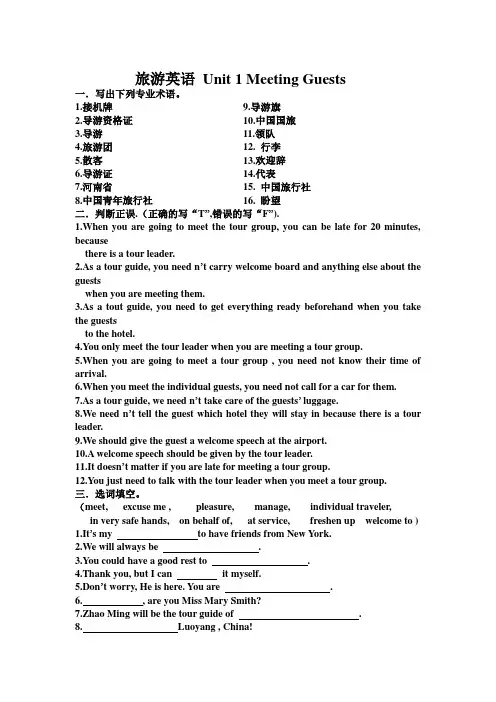
旅游英语Unit 1 Meeting Guests一.写出下列专业术语。
1.接机牌9.导游旗2.导游资格证10.中国国旅3.导游11.领队4.旅游团12. 行李5.散客13.欢迎辞6.导游证14.代表7.河南省15. 中国旅行社8.中国青年旅行社16. 盼望二.判断正误.(正确的写“T”,错误的写“F”).1.When you are going to meet the tour group, you can be late for 20 minutes, becausethere is a tour leader.2.As a tour guide, you need n’t carry welcome board and anything else about the guestswhen you are meeting them.3.As a tout guide, you need to get everything ready beforehand when you take the gueststo the hotel.4.You only meet the tour leader when you are meeting a tour group.5.When you are going to meet a tour group , you need not know their time of arrival.6.When you meet the individual guests, you need not call for a car for them.7.As a tour guide, we need n’t take care of the guests’ luggage.8.We need n’t tell the guest which hotel they will stay in because there is a tour leader.9.We should give the guest a welcome speech at the airport.10.A welcome speech should be given by the tour leader.11.It doesn’t matter if you are late for meeting a tour group.12.You just need to talk with the tour leader when you meet a tour group.三.选词填空。
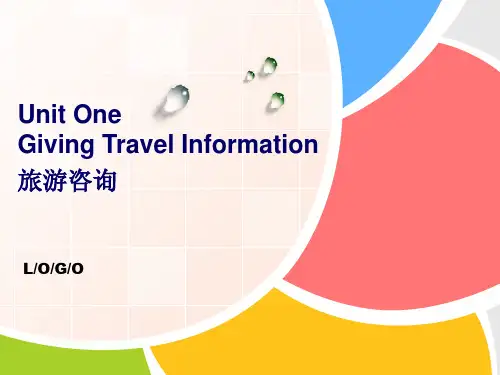
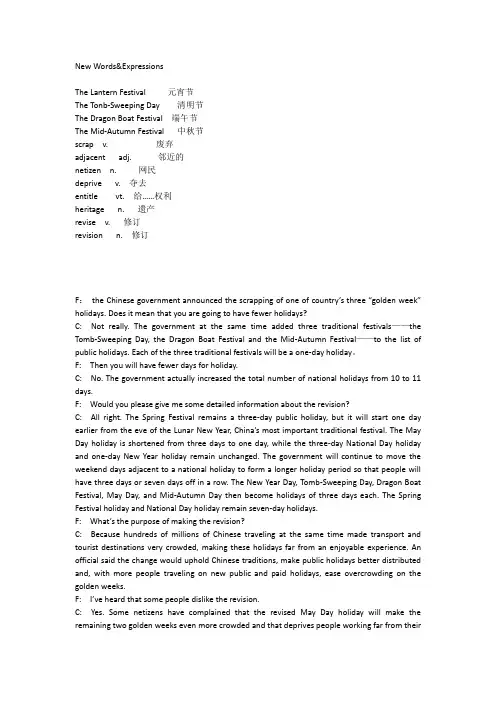
New Words&ExpressionsThe Lantern Festival 元宵节The Tonb-Sweeping Day 清明节The Dragon Boat Festival 端午节The Mid-Autumn Festival 中秋节scrap v. 废弃adjacent adj. 邻近的netizen n. 网民deprive v. 夺去entitle vt. 给……权利heritage n. 遗产revise v. 修订revision n. 修订F:the Chinese government announced the scrapping of one of country’s three “gol d en week” holidays. Does it mean that you are going to have fewer holidays?C: Not really. The government at the same time added three traditional festivals——the Tomb-Sweeping Day, the Dragon Boat Festival and the Mid-Autumn Festival——to the list of public holidays. Each of the three traditional festivals will be a one-day holiday。
F: Then you will have fewer days for holiday.C: No. The government actually increased the total number of national holidays from 10 to 11 days.F: Would you please give me some detailed information about the revision?C: All right. The Spring Festival remains a three-day public holiday, but it will start one day earlier from the eve of the Lunar New Year, China’s most important traditional festival. The May Day holiday is shortened from three days to one day, while the three-day National Day holiday and one-day New Year holiday remain unchanged. The government will continue to move the weekend days adjacent to a national holiday to form a longer holiday period so that people will have three days or seven days off in a row. The New Year Day, Tomb-Sweeping Day, Dragon Boat Festival, May Day, and Mid-Autumn Day then become holidays of three days each. The Spring Festival holiday and National Day holiday remain seven-day holidays.F: What’s the purpose of making the revision?C: Because hundreds of millions of Chinese traveling at the same time made transport and tourist destinations very crowded, making these holidays far from an enjoyable experience. An official said the change would uphold Chinese traditions, make public holidays better distributed and, with more people traveling on new public and paid holidays, ease overcrowding on the golden weeks.F: I’ve heard that some people dislike the revision.C: Yes. Some netizens have complained that the revised May Day holiday will make the remaining two golden weeks even more crowded and that deprives people working far from theirhometowns of the chance to go back home for family gatherings. They have even voiced their worry that a lot of company employees will not be off on the newly-added traditional festival holidays.F: Does the government know that?C: Yes. The spokesman said the revision could not satisfy all the people, whose interests might vary, but did respect the opinion of a majority. He said that 75 percent of the people were in favor of the change and that 60 percent of the netizens agreed to the way the May Day holiday was revised.F: I had paid holidays when I worked in my country. Do people have paid holidays in China? C: Yes. All employees of government agencies, enterprise and public-service institutions are entitled to take paid holidays after serving the same employer for one year. Employees who have worked for ten to 19 years will have ten days and those who have worked for 20 years and above would have 15 days.F: That’s wonderful.。
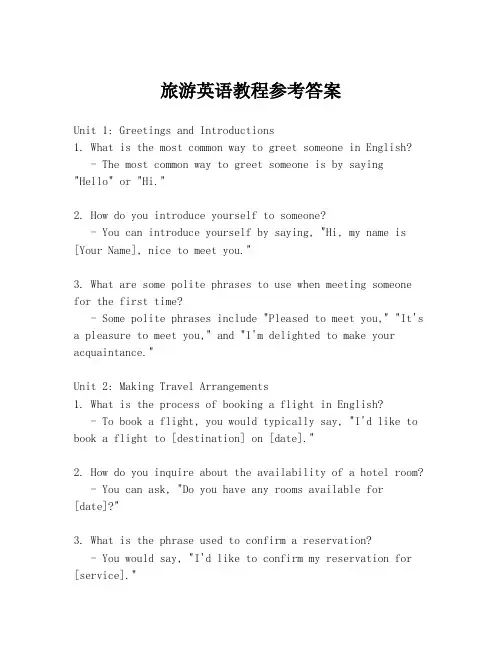
旅游英语教程参考答案Unit 1: Greetings and Introductions1. What is the most common way to greet someone in English? - The most common way to greet someone is by saying "Hello" or "Hi."2. How do you introduce yourself to someone?- You can introduce yourself by saying, "Hi, my name is [Your Name], nice to meet you."3. What are some polite phrases to use when meeting someone for the first time?- Some polite phrases include "Pleased to meet you," "It's a pleasure to meet you," and "I'm delighted to make your acquaintance."Unit 2: Making Travel Arrangements1. What is the process of booking a flight in English?- To book a flight, you would typically say, "I'd like to book a flight to [destination] on [date]."2. How do you inquire about the availability of a hotel room? - You can ask, "Do you have any rooms available for [date]?"3. What is the phrase used to confirm a reservation?- You would say, "I'd like to confirm my reservation for [service]."Unit 3: At the Airport1. What do you say when you need to check in for a flight?- You would say, "I'd like to check in for my flight to [destination]."2. How do you ask for directions to the gate?- You can ask, "Excuse me, could you please direct me to gate [number]?"3. What is the phrase used to request assistance with luggage? - You can say, "Could you help me with my luggage, please?"Unit 4: On the Plane1. How do you ask for a blanket or pillow?- You would ask, "Excuse me, could I get a blanket and a pillow, please?"2. What do you say if you need to use the restroom?- You can say, "Excuse me, where is the restroom, please?"3. How do you request a beverage or snack?- You would say, "Could I have a [beverage or snack], please?"Unit 5: At the Hotel1. What is the phrase used to check into a hotel?- You would say, "I have a reservation for [your name],I'd like to check in."2. How do you ask about the hotel's amenities?- You can ask, "What amenities does the hotel offer?"3. What do you say if you need to request extra towels?- You would say, "Could I get some extra towels, please?"Unit 6: Dining Out1. How do you ask for a table at a restaurant?- You would say, "Do you have a table for [number of people]?"2. What is the phrase used to request the menu?- You can ask, "May I see the menu, please?"3. How do you order a meal in English?- You would say, "I'd like to order [dish name], please."Unit 7: Sightseeing1. How do you ask for directions to a tourist attraction?- You can ask, "Could you tell me how to get to [attraction]?"2. What is the phrase used to buy a ticket for a tour?- You would say, "I'd like to buy a ticket for the [tour name]."3. How do you inquire about the operating hours of a museum? - You can ask, "What are the opening hours of the museum?"Unit 8: Shopping1. How do you ask for the price of an item?- You would ask, "How much does this cost?"2. What is the phrase used to negotiate a price?- You can say, "Could you give me a discount?"3. How do you ask for a receipt?- You would say, "May I have a receipt, please?"Unit 9: Emergency Situations1. How do you ask for help in an emergency?- You would say, "I need help, this is an emergency!"2. What is the phrase used to call for medical assistance? - You can say, "I need a doctor, please!"3. How do you report a lost item?- You would say, "I've lost my [item], can you help me find it?"Unit 10: Cultural Etiquette1. How do you show respect for local customs?- You can say, "I am here to learn about and respect your customs."2. What is the phrase used to apologize for a cultural mistake?- You can say, "I apologize。
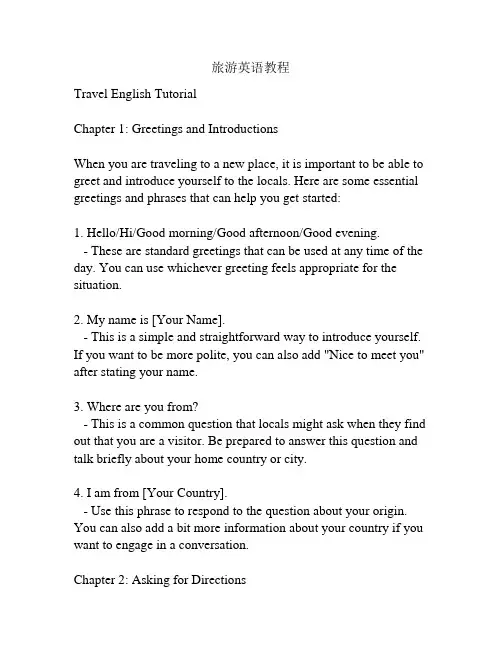
旅游英语教程Travel English TutorialChapter 1: Greetings and IntroductionsWhen you are traveling to a new place, it is important to be able to greet and introduce yourself to the locals. Here are some essential greetings and phrases that can help you get started:1. Hello/Hi/Good morning/Good afternoon/Good evening.- These are standard greetings that can be used at any time of the day. You can use whichever greeting feels appropriate for the situation.2. My name is [Your Name].- This is a simple and straightforward way to introduce yourself. If you want to be more polite, you can also add "Nice to meet you" after stating your name.3. Where are you from?- This is a common question that locals might ask when they find out that you are a visitor. Be prepared to answer this question and talk briefly about your home country or city.4. I am from [Your Country].- Use this phrase to respond to the question about your origin. You can also add a bit more information about your country if you want to engage in a conversation.Chapter 2: Asking for DirectionsWhen you are exploring a new place, you'll often find yourself in need of directions. Here are some useful phrases that can help you ask for directions:1. Excuse me, could you please tell me how to get to [Destination]? - This is a polite way to ask for directions. Make sure to use gestures or point at a map if you have one to help the person understand your question better.2. Is it far from here?- Use this phrase to inquire about the distance between your current location and your destination. The response will give you an idea of whether it is within walking distance or if you need to take transportation.3. Could you show me on the map?- If you have a map, you can ask someone to point out the directions or mark the route for you. This can be particularly helpful if you are unsure about the verbal directions given.4. Thank you so much for your help!- Always remember to express your gratitude when someone helps you with directions. It shows appreciation for their time and effort.Chapter 3: Ordering FoodTrying local cuisine is a must when traveling. Here are some phrases that can help you order food at restaurants or street stalls:1. May I see the menu, please?- This is a polite way to ask for the menu. Once you have it, take your time to look through the options before deciding what to order.2. What do you recommend?- If you are uncertain about what to order, you can ask the waitstaff for their suggestions. They can recommend popular dishes or specialties.3. I would like to order [Dish Name].- Use this phrase to place your order. Be sure to pronounce the dish correctly or point to it on the menu if you are unsure about the pronunciation.4. Could I have the bill, please?- When you finish your meal and want to pay, you can ask for the bill using this phrase. The waitstaff will bring it to you so you can settle the payment.Remember to be polite and respectful when interacting with locals, and don't be afraid to ask for help or clarification if needed. Enjoy your travel experience and have fun discovering new places!。
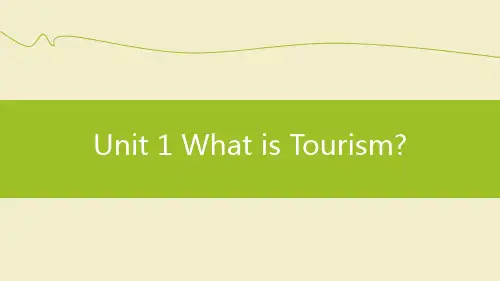
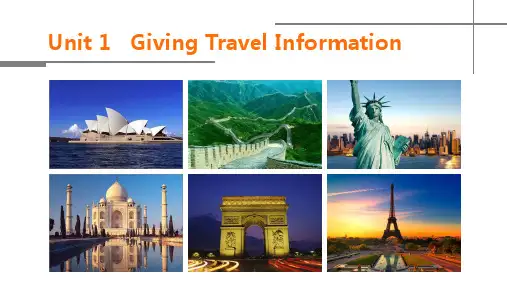
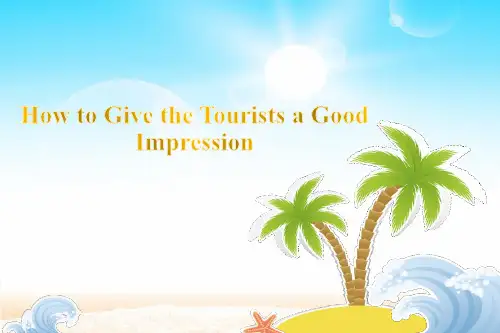
1.Booking FightsDialogue:A.Hello, I’d like to confirm my reservation. My name is Anne Lin.B.What’s your name again, please?A.L-I-N, Lin.B.I see. What’s your flight number?A.I’m on Flight 724 to London on October 61.B.Hold on, please…Yes, Flight 724 for London, departing onOctober 31, is confirmed.Study Point:Vocabulary:A.Check-in counterB.Passport inspection area/passivity countryC.Passenger and baggage inspectionD.Boarding gateE.PlaneUseful expressions:1.I’d like to book a flight Hong Kong to Chicago on Tuesday, July12.2.I’d like to book a flight that leaves in the morning.3.I’d like to reserve a seat for, Boston on May 8.4.I’d like to reserve a seat from Los Angeles to Shanghai.5.Are there any flight to Beijing on Sunday?6.Are there any direct flights to Vancouver?7.What time does Flight 724 arrive in Singapore?8.Which airport do I leave from?9.How much is the airfare from Paris to Beijing?10.---When would you like to leave?---I’d like a flight on May 15---The sooner, the better.11.May I confirm my reservation?12.Pleas confirm my flight.13.May I have your name and flight number?14.---Your name, please---Lily Wu. Wu is my family name.---How do you spell it?---That’s W-U, Wu.---I can’t find your name on the list---I made my reservation in China. Would you check it again, please?15.My name is David Lee. My flight number is BA604 to Sydneyon October16.I’d like to confirm the departure time.17.By what time should I check in?18.I’d like to change my reservation.19.I’d like to change my flight date from June 5 to June 9.20.I’d like to change a reservation for flight number 212 on March22.21.Can I change my reservation to an earlier flight?22.Which flights have seats available?23.I’ll go standby.24.I’d like to check in now.25.Please show me the seating plan.26.I’d like a window seat, please.27.I’d like an aisle seat, please.28.A seat somewhere in the front, please.29.A seat somewhere in the back, please.30.I’d like to sit with my friend.31.Altogether I have two pieces of luggage.32.I’d like to bring this on board.33.---Your baggage is overweight.---How much is the extra fare?34.What is the boarding time?35.Where is the boarding time?36.What is the gate number for the United Airlines flight to Rome?37.Is this the right way to Gate 14?38.Where is the duty-free shop?。